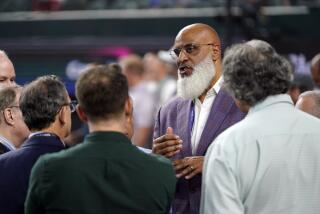Talks Quiet but Not Owners
- Share via
Acting Commissioner Bud Selig and management negotiator Randy Levine continued their infomercial campaign Thursday, trying to answer questions and build consensus support among owners for the proposed labor settlement.
There were no negotiating sessions between Levine and union leader Donald Fehr for a third consecutive day, but Levine said it would be wrong “to read anything negative into that.”
Said Fehr: “As long as I’m persuaded that Randy is trying [to work with his constituency], I’m comfortable giving him time, as I would hope he’d give me time.
“If I ever felt this was an attempt to put pressure on us, I’d feel differently, but at this point I don’t sense that.”
The largest of the remaining issues is the union’s demand for the restoration of service time for the period that the players were on strike in 1994 and ’95.
It is now believed the union will waive all damage and litigation claims stemming from the strike and government rulings as trade-off for service time but will not accept any settlement that does not include it.
Selig, who is believed to have the 21 votes needed to ratify but is painstakingly cautious in his frequent pursuits of unanimity, stressed again Thursday there is no movement among “X number of clubs” to overturn the deal on service time.
He added, however, that many clubs have questions and concerns about that and other issues.
“This is the most important thing we’re going to do,” he said. “The clubs have a right to understand every issue in detail.”
Although players have received service time after previous strikes, and owners have always known the union’s position, many still say the precedent needs to be broken or there is nothing to deter players from striking again.
Wayne Huizenga, owner of the Florida Marlins, and Andy MacPhail, president of the Chicago Cubs, are the most outspoken of those in opposition to service time, sources said. There are also clubs that oppose giving players a second tax-free year at the end of the agreement, since it leaves the clubs with nothing to build on in the next talks relative to cost constraint.
“The situation at the end of the agreement would be the same as it is now,” a National League owner said.
The proposed settlement wasn’t negotiated in a vacuum, however. Levine was in frequent contact with Selig and the owners’ labor policy committee.
It calls for a luxury tax in 1997, ’98 and ’99. There would be no tax in 2000, and the union would have an option on a tax-free 2001. In a trade-off for that option, the union agreed to reduce its share of divisional playoff receipts from 80% to 60% and allow owners to expand the divisional round from five to seven games.
More to Read
Go beyond the scoreboard
Get the latest on L.A.'s teams in the daily Sports Report newsletter.
You may occasionally receive promotional content from the Los Angeles Times.










